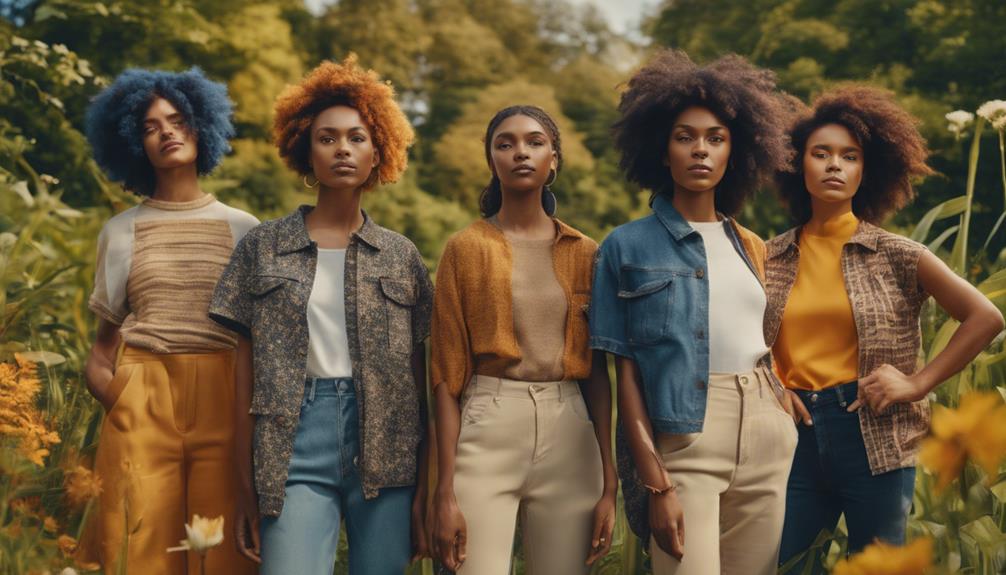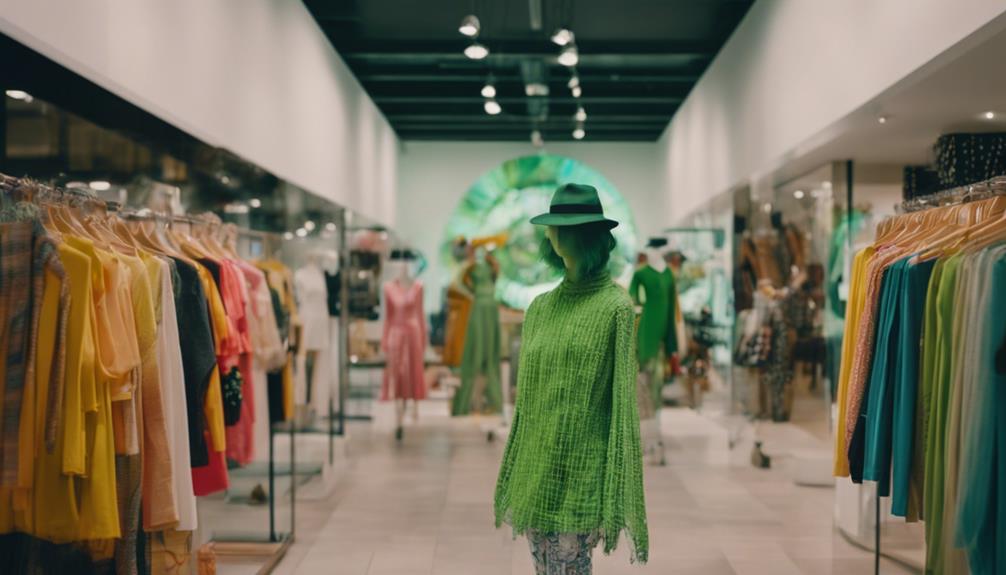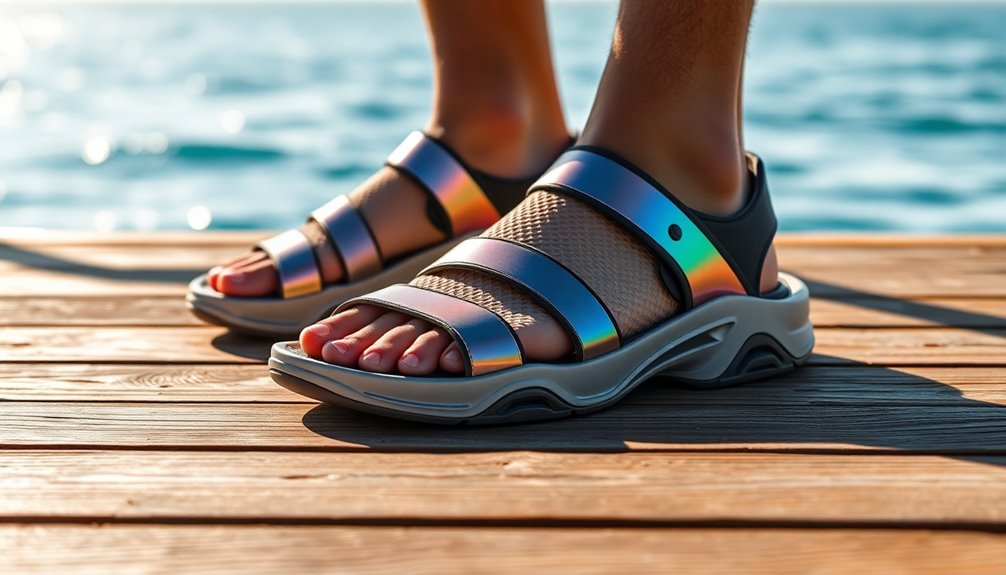The audience interested in sustainable fashion is varied, mainly made up of environmentally conscious young and middle-aged consumers. Gen Z and millennials are leading the way, with many favoring second-hand options and sustainable brands. More than half of these consumers are willing to pay extra for ethical choices, indicating a move away from fast fashion. Families and professionals are also adopting these values, prioritizing quality and environmental impact. Their preferences are transforming the industry, creating a demand for transparency and integrity in fashion. If you’re interested in the trends driving this transition, there’s much more to discover!
Key Takeaways
- Young and middle-aged men are increasingly driving the demand for sustainable fashion and eco-friendly brands.
- 75% of Gen Z consumers prefer second-hand clothing, prioritizing environmental impact and circular fashion practices.
- Millennials are willing to pay a premium for sustainable options, with 55% supporting eco-friendly clothing.
- Families and professionals emphasize sustainability as core values, often opting for second-hand shopping to reduce waste.
Understanding Sustainable Fashion Consumers
Understanding sustainable fashion consumers starts with recognizing that a significant portion of them are young and middle-aged men who actively seek to minimize their environmental impact through choices like pre-owned clothing. These consumers are increasingly aware of sustainability issues in the fashion industry, with around 72% of US consumers acknowledging the importance of ethical consumption.
You might be surprised to learn that 75% of Gen Z opts for second-hand clothing, demonstrating a strong alignment with circular fashion practices. This trend isn't just limited to younger generations; many millennials are also willing to pay a premium for sustainable options, reflecting a shift in values towards more responsible purchasing decisions.
When you consider that approximately 73% of British consumers who buy sustainable clothing also engage in second-hand shopping, it's clear that sustainable fashion consumers are committed to reducing waste and promoting a more sustainable lifestyle.
As you dive deeper into this market, you'll see that these consumers prioritize quality and ethics, making choices that not only benefit themselves but also contribute positively to the planet. Embracing these values can lead to a more significant impact on the fashion industry as a whole.
Key Demographics Driving Demand

Young and middle-aged men are increasingly driving the demand for sustainable fashion as they embrace eco-friendly brands and practices. This shift reflects a broader change in the sustainable fashion market, where consumer demand for sustainable options has surged. You might notice that these men prioritize brands that align with their values, demonstrating a willingness to invest in clothing that's both stylish and environmentally responsible.
Moreover, Millennials are stepping up, ready to pay a premium for sustainable options. Their commitment to eco-consciousness reshapes the market landscape, as they often seek out brands that prioritize ethical production methods.
British fashion consumers are also making waves, with 73% opting for sustainable clothing while engaging in second-hand purchases, showcasing a trend towards circular consumption.
Interestingly, while women under 35 have traditionally been the focus of fast fashion brands, many are now pivoting towards sustainable alternatives. This demographic shift reveals a growing awareness of environmental issues, compelling women to reconsider their shopping habits.
Together, these groups are essential players in the sustainable fashion market, driving demand and setting new standards for fashion consumers everywhere.
The Role of Millennials and Gen Z

Millennials and Gen Z are reshaping the fashion landscape as they prioritize sustainable options and drive the demand for eco-friendly brands.
You'll find that Millennials show a strong commitment to sustainable fashion, with 55% willing to pay more for eco-friendly clothing. This generation isn't just about trendy styles; they genuinely care about the impact of their purchases.
Gen Z takes it a step further, with a staggering 75% opting for pre-owned clothes to reduce consumption and minimize their environmental footprint. This younger demographic is leading the charge toward circular fashion, with 73% of British consumers who buy sustainable also purchasing second-hand items.
It's clear that both Millennials and Gen Z actively seek brands that prioritize sustainability, with 69% of Vogue readers placing eco-consciousness at the forefront of their shopping decisions.
Interestingly, even young and middle-aged men are joining this movement, showing a growing preference for sustainable brands.
As Millennials and Gen Z continue to influence the market, their values are reshaping the fashion industry, pushing for a more sustainable future that aligns with their beliefs.
Families and Professionals Embracing Sustainability

Families and professionals are increasingly embracing sustainable fashion as a core value in their lives.
You might notice that eco-conscious choices are shaping how families shop and what professionals prioritize in their wardrobes.
This shift not only reflects a commitment to ethical consumption but also highlights the importance of aligning personal values with fashion decisions.
Eco-Conscious Family Values
Eco-conscious consumers are increasingly prioritizing sustainability in their purchasing decisions, reflecting a significant shift towards ethical practices and responsible consumption. Families are at the forefront of this trend, recognizing the importance of sustainable clothing and eco-friendly clothing for future generations. In fact, 73% of British families who buy sustainable clothing also seek out second-hand options, effectively reducing consumption and waste.
As you navigate your shopping choices, consider how your values align with those of a growing community. About 63% of consumers emphasize the importance of brands promoting sustainability, making it essential for you to support labels that reflect these principles. With 72% of US consumers acknowledging the environmental issues within the fashion industry, the demand for responsible options is clear.
Younger demographics, particularly Gen Z, are leading the charge, as 75% of them prefer purchasing second-hand items to minimize their environmental impact. By embracing eco-conscious family values, you're not just making a statement; you're contributing to a more sustainable future.
Your choices matter—together, we can foster a culture of responsibility and care for our planet.
Professionals Prioritizing Ethics
As more professionals recognize the impact of their choices, they're increasingly prioritizing ethical fashion and sustainable materials in their wardrobes. A remarkable 67% of professionals consider sustainable materials essential for their purchasing decisions, showcasing a significant shift toward responsible fashion. This trend isn't just a passing phase; 55% of consumers express genuine interest in purchasing sustainable clothing, indicating a growing market segment that values ethical practices.
Millennials and Gen Z, in particular, are leading this charge. These professionals are willing to pay more for sustainable options, demonstrating that they value sustainability over mere affordability. Additionally, nearly 73% of British consumers who buy sustainable clothing also engage in second-hand shopping, illustrating a strong preference for eco-friendly practices not just in their personal lives but also within their professional circles.
The demand for sustainable fashion is projected to grow, with eco-friendly clothing expected to add $1.57 billion to global sales by 2025. This underscores the economic potential of targeting ethically minded consumers—professionals who are redefining fashion by choosing sustainable materials and responsible practices in their everyday lives.
Influences on Consumer Choices

When you consider your fashion choices, social media likely plays a huge role in what you buy.
The influence of your peers and the trust you have in brands can shape your preferences towards sustainable options.
Understanding these dynamics can help you make more informed choices in your wardrobe.
Social Media Impact
Social media greatly shapes your shopping choices, especially when it comes to sustainable fashion, as influencers showcase eco-friendly options and lifestyles. This digital environment influences you as a consumer, with 54% of individuals admitting their interest in fast fashion stems from these online figures.
However, the narrative is shifting; about 73% of British consumers buying sustainable fashion also explore second-hand options, often inspired by social media platforms that promote eco-conscious living.
Gen Z is leading the charge, with 75% of this demographic opting for pre-owned clothes to lessen their environmental impact. Social media campaigns that highlight sustainable practices notably boost brand visibility and consumer trust. In fact, 69% of Vogue readers prioritize sustainability when making purchasing decisions.
The rise of social media has heightened awareness of sustainability issues in fashion, leading 72% of US consumers to acknowledge these concerns and express a desire to make informed purchases.
It's clear that the digital influence isn't just about trends; it's about cultivating a mindful approach to fashion that resonates with your values.
Peer Influence Dynamics
Peer recommendations play an essential role in shaping your choices in sustainable fashion, with 26% of consumers relying on advice from family and friends. This highlights how much peer influence impacts your decisions. When you see friends or family opting for eco-friendly brands, it's likely to inspire you to reflect on those options yourself.
Social media amplifies this effect, as 54% of consumers cite social media influencers as key players in their fashion choices. These influencers often showcase sustainable fashion brands, making it easier for you to discover and adopt eco-friendly styles. Particularly among young consumers like those in Generation Z, peer influence is significant; 75% of them buy second-hand clothing to lessen their environmental impact.
Community initiatives also play an important role, encouraging you to engage in sustainable shopping practices when surrounded by like-minded individuals. This sense of belonging can motivate you to make more eco-conscious consumer choices.
Brand Trust Importance
Your choices in sustainable fashion are heavily influenced by how much you trust the brands you support. With 75% of consumers deeming brand trust essential for their purchasing decisions, it's clear that credibility matters. When you know a brand is transparent about its sourcing and production processes, you're more likely to feel confident in your purchase. In fact, 67% of consumers like you consider sustainable materials vital, making transparency key to building that trust.
If you remain loyal to trusted brands—70% of consumers do—you're contributing to a market that values ethical practices. However, skepticism looms large; 88% of consumers express doubts about sustainability claims. This means brands need to work hard to establish credibility to foster trust and encourage sustainable purchasing behavior.
Interestingly, 55% of consumers are interested in buying sustainable clothing, but only if they trust the brands' commitments to ethical practices. This highlights the direct connection between brand trust and your consumer choices in sustainable fashion.
Ultimately, by supporting brands that prioritize transparency and ethical practices, you not only make informed choices but also contribute to a more sustainable future.
Addressing Greenwashing Concerns

Addressing greenwashing concerns is essential for brands aiming to build trust with consumers who are increasingly skeptical about sustainability claims. With 72% of U.S. consumers aware of sustainability issues in fashion, it's clear that misleading information can seriously harm a brand's reputation.
You want to feel confident in your purchases, and when 59% of sustainability claims by European brands are found misleading, it's no wonder you're cautious.
To combat greenwashing, brands must prioritize transparency in their sourcing and production practices. By openly sharing their sustainable practices, they can help you make informed choices. Since 55% of consumers express an interest in sustainable clothing but nearly half are unsure where to find trustworthy brands, clear communication is vital.
Brands should also recognize that 66% of consumers are focused on limiting climate change impacts, pushing them to provide credible sustainability claims. By enhancing education around sustainable practices, brands can foster genuine connections with you, the consumer.
In a marketplace flooded with options, transparency and honesty can set a brand apart, ensuring you feel good about your fashion choices.
Frequently Asked Questions
Who Is the Target Audience of Sustainable Fashion?
The target audience for sustainable fashion includes young adults like you, especially those aged 18 to 35. You value eco-friendly choices, often prioritize ethical considerations, and are willing to invest in responsible, stylish clothing options.
Who Is the Target Audience for the Fashion Industry?
The fashion industry mainly targets young consumers aged 18 to 24, drawn to trendy, affordable clothing. However, millennials and Gen Z are increasingly prioritizing sustainability, influencing brands to adapt their offerings to meet these evolving preferences.
Who Is the Target Market for Sustainability?
You'll find the target market for sustainability includes environmentally conscious consumers, particularly younger generations like Gen Z and Millennials. They prioritize ethical choices and often opt for pre-owned or sustainable clothing, driving a significant shift in fashion trends.
What Age Group Is Most Interested in Sustainable Fashion?
You'd think sustainable fashion appeals only to older folks, right? Surprisingly, it's actually Gen Z and young millennials leading the charge. They're actively choosing eco-friendly options and pre-owned clothes, redefining fashion's future for everyone.
Conclusion
So, it turns out that the target audience for sustainable fashion isn’t just eco-warriors or hipsters; it’s everyone from families to professionals. In fact, many people are becoming more conscious of the environmental and social impact of the fashion industry, leading them to seek out more sustainable options. This has led to the rise of some of the most sustainable fast fashion brands, which are gaining popularity among a wide range of consumers. From affordable organic cotton basics to trendy, recycled materials, there are now options for everyone to make more environmentally friendly choices in their wardrobe. As more and more people become aware of the impact of their clothing choices, sustainable fashion brands are stepping up to provide stylish and conscientious options for consumers. These brands are not only focused on environmental sustainability, but also on ethical labor practices and fair wages for the workers in their supply chain. By supporting these brands, consumers are not only making a statement with their fashion choices, but also contributing to positive change in the fashion industry.
You might think you're above trends, but here you are, drawn into a movement that's reshaping the industry.
Ironically, while you're trying to save the planet, you might just be adding a cool new jacket to your wardrobe.
Who knew making a difference could be so stylish?
Embrace it—you're part of the change!









